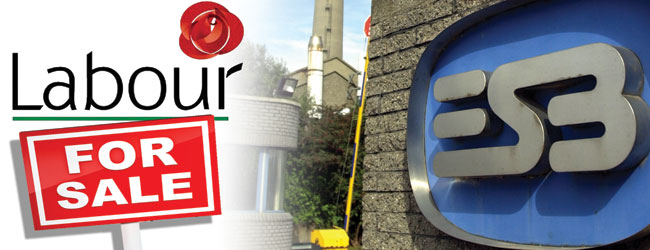30 September 2011
ESB SELL-OFF PLAN | SINN FÉIN TDs DEFEND PUBLIC RESOURCES
BY MARK MOLONEY
ONE of the cornerstones of democratic socialism is the idea that means of production, that the infrastructural capital and the natural resources of a state should be state owned or commonly controlled.
In government in the South we have the right-wing Fine Gael party and the self-proclaimed ‘democratic socialists’ of Labour. The sell-off of key state assets and companies can be expected from right-wing Thatcherites like Fine Gael. The inclusion of Labour as coalition partners should have ensured that any attempt by Fine Gael to privatise state and semi-state companies would be resisted.
During their election campaign Labour assured the public that they would oppose the “short-term privatisation of key assets” but now it has caved in to meet the demands of the EU/IMF. (Whatever happened to “Frankfurt’s way or Labour’s way”, Eamon?) On top of the ESB, the Government is also considering selling off the state’s remaining stake in Aer Lingus.
Labour TD Pat Rabbitte once said: “The Eircom privatisation was a disaster. Workers lost their jobs, small investors have been badly burnt, and ownership of the company passed to foreign interests.” He made these comments after Michael McDowell announced plans to sell-off or at least partially sell-off Bord Gáis, Aer Lingus and, you guessed it, the ESB.
But the lack of control is not the only negative effect that comes with selling off key state infrastructure, the ESB is an extremely profitable asset. In 2010, its profts exceeded €580million. The bigger the stake a state has in such companies, the bigger the profits that are returned to the Exchequer. The selling-off of shares in the ESB, while it may be financially beneficial in the short term, ultimatley deprives the state of a long-term income and places this asset in the hands of privateers.
At the beginning of the year, Labour declared that it was “committed to the concept of public enterprise” and that it opposed to the “privatisation of energy networks”. But, as we have seen, it appears that Labour’s promises are not worth the paper they are written on.
Labour has proclaimed itself to being a party that stands up for workers, yet the reality is that when companies are privatised, workers lose their jobs. Private shareholders are only interested in profits; they are not interested in whether 400 people will lose their jobs as the company seeks to cut costs and services and increase profits. Eamon Gilmore often speaks of his admiration for 1916 leader and Proclamation signatory James Connolly. Indeed, he spoke eloquently about Connolly during a commemoration in Arbor Hill earlier this year. However, as Gerry Adams said in the Dáil during the debate on the ESB:
“I would remind the Labour Party of the 1916 Proclamation which says ‘We declare the right of the people of Ireland to the ownership of Ireland, and to the unfettered control of Irish destinies, to be sovereign and indefeasible.’ It does not finish with ‘unless the big bankers, the golden circle, the IMF or Fine Gael dictate otherwise’.”
Labour’s fast-buck approach to public assets
THE Labour/Fine Gael Coalition is adopting a “fast-buck approach” to the ESB and state assets, Sinn Féin Public Expenditure and Reform spokesperson Mary Lou McDonald TD said. She said Labour was turning its back on its own policy programme.
Sinn Féin TD Caoimhghín Ó Caoláin described the sale of part of the state’s stake in the ESB as “the worst kind of short-sighted policy that will come back to haunt our society and our economy in the years ahead”. He said:
“We know who benefited from the fiasco that was the Eircom privatisation? It’s the likes of Tony O’Reilly and other privateers who creamed off profits and dividends. And at what cost to Ireland?
“This state, which should be a world leader in communications infrastructure, now lags behind other EU and OECD states in terms of broadband availability per capita.”
Mary Lou McDonald said:
“The ESB is self-financing, has paid €4.3billion in taxes and dividends to the state over the last ten years and is an international leader in the energy sector.
Mary Lou McDonald added:
“Eircom has taught us that privatisation does not deliver First World infrastructure.”
Follow us on Facebook
An Phoblacht on Twitter
Uncomfortable Conversations

An initiative for dialogue
for reconciliation
— — — — — — —
Contributions from key figures in the churches, academia and wider civic society as well as senior republican figures





